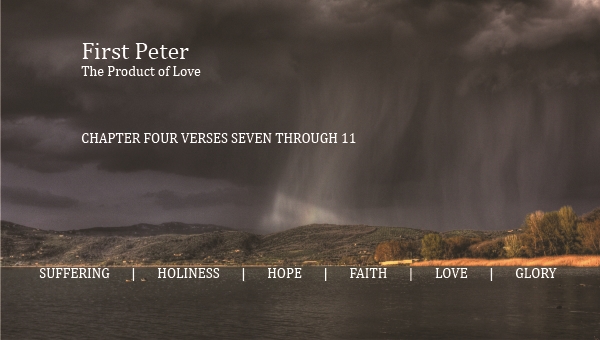By Tyson Thorne

Continuing with the theme of judgment, verse seven warns that the end of all things is near. His warning rings even more loudly today than then. Peter lists for us examples of how we are to live, but none of these examples are new as he has raised them elsewhere within the same letter. In other words, these examples are so important he mentions them twice.
Since the end is near we are to be clear minded and self-controlled (1.13a); in order that we can pray (3.7, 3.12); above all we are to love each other deeply (1.22c), for this kind of love does not see the faults of others.
Clearly love is a product of our holiness. I read a post of Facebook this week that applies here:
The writer was certainly not “clear-minded.” Homosexuality is not an example of love, no matter how much one’s emotions may otherwise indicate. We know from the Bible that "God is love" (1 John 4.8), that God commands us to love him and each other (Luke 10.27) and tells us that homosexuality is "dishonorable passion" and "depraved" (Romans 1.27-28). The only conclusion that can be made is that homosexuality is not love, but rather an emotional counterfeit. If we live the way we are called to then the world will see what real love is and be able to recognize the conterfeits for what they are.
One of the products of true, deep love is that of hospitality (verse nine), especially comforting to Christians who were forced to find new homes by intense persecution. How hospitable are you to others? Shortly after moving to north Denver I began looking for a new church home. I visited one just down the street from where I live and entered carrying my Bible and a travel mug full of coffee. The only person who approached to welcome me didn’t begin by introducing themselves or finding out what brought me to church, instead they impressed upon me that beverages were not allowed in the sanctuary. He asked me to take my coffee back to my car, which I did. Once at my car I also placed myself in the driver’s seat and went to another church. I didn’t mind the rule, in fact I think it shows a desire to be good stewards of their building. The greeter, however, could have easily deduced that I was a visitor since I didn’t know the rules and greeted me with greater hospitality.
Deep love is also evidenced through the two distinct categories of Christian service: speaking and serving (Acts 6). Through our speech and our service to others we honor them and love always honors the loved one. Yet it is more than serving the object of our love, it is speaking well of them to others and serving those who are important to our loved one. It is easy to see how this applies to a spouse or significant other, it is less obvious how this applies to our relationship with God. If we love God we should speak well about him to others, and serve everyone as they are important to God. Serving others extends outside the body of Christ, it extends even (and especially) to those who on those steps of depravity we discussed earlier. How better to convince someone what true love is than by demonstrating it? Both services, speaking and serving, are performed out of God’s grace (or gifts, which is virtually the same Greek word). In doing so the believer brings attention to God’s holiness and grace, and less attention to his own works.
Love is a hallmark of holiness and should be the first characteristic people notice about us. Just as the greeter mistakenly showed more care about rules than a visitor, we (myself included) often show disdain or judgment toward those who are not holy. Such mistakes are not okay. We must strive to show we are set apart not by abhorrence to sin and brokenness but by revealing God’s character through our own.
THE NEXT POST IN THIS SERIES: https://think-biblically.com/10-lucubrations/203-suffering-with-rejoicing
|
|

